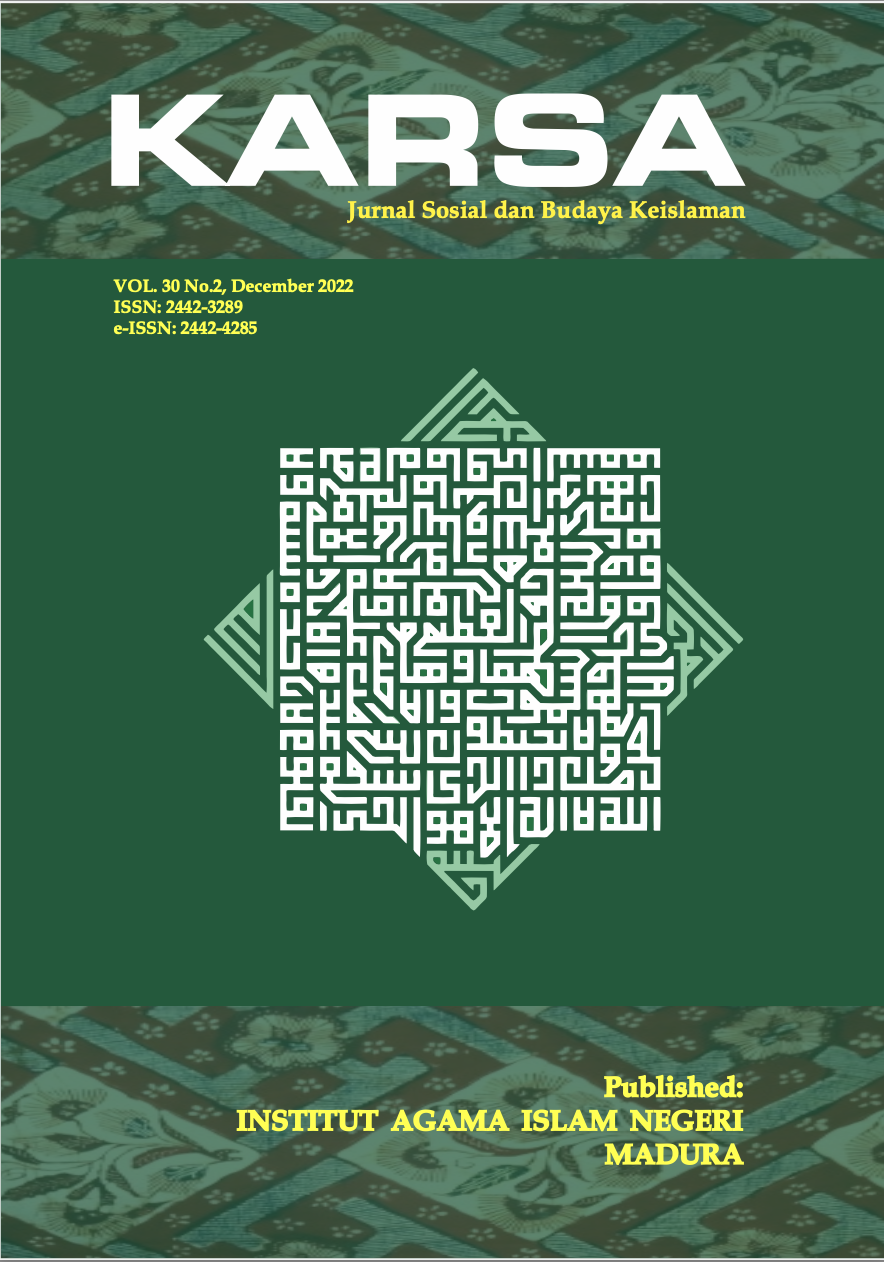Kampung Madinah Temboro as Tablighi Jama῾at Sub-Cultural Community: A Socio-Historical Studies
 Abstract views: 981
,
Abstract views: 981
,
 PDF downloads: 288
PDF downloads: 288
Abstract
Temboro, Magetan, is a unique village widely known as Kampung Madinah. The nickname comes from the Islamic tradition embedded in villagers’ everyday lives, associated with Medina, the Propeth’s city. Further observations show that their Islamic tradition is distinctive, primarily referring to the community’s affiliation with the transnational Tablighi Jama’at movement. This fact implies that the community has its worldviews, moral values, and lifestyle, which puts them into a sub-cultural community category. This research examines the socio-historical aspect of Kampung Madinah Temboro as Tablighi Jama’at Sub-Cultural Community between 1984 and 2009. Therefore, we employ historical inquiries and social approaches as methods. We discover that: 1) Pesantren al-Fatah and Markaz Temboro play their central roles in forming Kampung Madinah as a subcultural community based on the Tablighi Jama’at ideology; 2) The subcultural indicators appear in how they dress, how they interact, symbols in the environment, the values they hold, and the integration of the Tablighi Jama’at ideology into people’s daily activities; and 3) Both the Pesantren al-Fatah and the Tablighi Jama’at Markaz networks increase the probability of similar subcultural community emerging elsewhere.
Downloads
References
Abdillah, Uzairon Thoifur. Speech Audio Recording. Temboro, 2012.
al-Bukhārī. Ṣaḥīh Al-Bukhārī. Riyadh: Bayt al-Afkār al-Dauliyyah, 1997.
Alfath, Khairuddin. “Pendidikan Karakter Disiplin Santri Di Pondok Pesantren Al-Fatah Temboro.” Al-Manar 9, no. 1 (2020): 125–64. https://doi.org/10.36668/jal.v9i1.136.
Ali, Jan. “Islamic Revivalism: The Case of the Tablighi Jamaat.” Journal of Muslim Minority Affairs 23, no. 1 (2003): 173–81.
Al-Khandhlawi, Muhammad Yūsuf. Al-Ahādīṡ al-Muntakhabah. New Delhi: Idārah Isyāʻat Dīniyyāt Nizamuddin, 2006.
Al-Khandhlawi, Muhammad Zakariyā. Manhaj Al-Hayāh al-Īmāniyyah Wa al-Tarbiyah al-Dīniyyah Fi Ḍau’i al-Kitāb Wa al-Sunnah Ya’nī Majmūʻah al-Rasā’il Fi Faḍā’il al-A’māl Wa al-Akhlāk. Shahranpur: Al-Maktabah al-Yahyawiyyah, 2011.
———. Wujūb I’fā ’al-Liḥyah, n.d.
Alwi, Fadhol Muhammad Luthfi. “Peran Pondok Pesantren Terhadap Kegiatan Bisnis Di Kampung Madinah Desa Temboro Kec Karas Kab Magetan Analisis Etika Bisnis Islam: Studi Kasus Pengusaha Lingkungan Pondok Pesantren Temboro. - Digilib UIN Sunan Ampel Surabaya.” UIN Sunan Ampel Surabaya, 2020. http:// digilib.uinsa.ac.id/38817/.
Arifin, Zainal. “Authority of Spiritual Leadership at Pesantren Temboro Based on Jamaah Tabligh Ideology.” Jurnal Pendidikan Islam 6, no. 2 (December 27, 2017): 265–92. https://doi.org/10.14421/ jpi.2017.62.265-292.
Arifin, Zainal, Maragustam Maragustam, Muqowim Muqowim, and Hafidh ’Aziz. “The Kiai’s Cultural Strategy in Shaping the Religious Culture of the Community of Temboro Magetan Village, East Java.” Dinamika Ilmu 21, no. 2 (December 15, 2021): 369–81. https://doi.org/10.21093/di.v21i2.3657.
Arifin, Zainal, Bulbul Ashraf Siddiqi, Dudung Hamdun, and Sri Rahmi. “The Impact of Masturah Program on The Families of Tablighi Jamaat at Temboro Village in Indonesia.” Nazhruna: Jurnal Pendidikan Islam 4, no. 1 (March 20, 2021): 136–49. https://doi. org/10.31538/nzh.v4i1.1128.
Awabien, Muhammad Rasyied. “Living Hadis Di Kampung Madinah, Temboro, Magetan.” Jurnal Living Hadis 5, no. 1 (July 11, 2020): 105–32. https://doi.org/10.14421/livinghadis.2020.2171.
Aziz, Abdul. “The Jamaah Tabligh Movement in Indonesia: Peaceful Fundamentalist.” Studia Islamika 11, no. 3 (2004). https://doi. org/10.15408/sdi.v11i3.596.
Badriza, Kholili. “Pondok Pesantren Al-Fatah Temboro sebagai Induk Madrasah Asia Selatan Berbasis Jama’ah Tabligh di Indonesia.” FIHROS: Jurnal Sejarah dan Budaya 6, no. 1 (June 8, 2022): 10–26.https://ejournal.staisyekhjangkung.ac.id/index.php/fihros/article/view/21.
Bhandari, Humnath, and Kumi Yasunobu. “What Is Social Capital? A Comprehensive Review of the Concept.” Asian Journal of Social Science 37, no. 3 (January 1, 2009): 480–510. https://doi.org/10. 1163/156853109X436847.
Dhofier, Zamakhsyari. Tradisi Pesantren: Studi Tentang Pandangan Hidup Kyai. Jakarta: LP3S, 1994.
Gaborieau, M. “Transnational Islamic Movements: Tablighi Jama’at in Politics?” ISIM Newsletter 3, no. 1 (1999): 21–21. https://hdl. handle.net/1887/17321.
Gaborieau, Marc. “What Is Left of Sufism in Tablîghî Jamâ‘At?” Archives de Sciences Sociales Des Religions, no. 135 (September 1, 2006): 53–72. https://doi.org/10.4000/assr.3731.
Gordon, Milton M. “The Concept of Sub-Culture and Its Application.” Social Forces 26, no. 1 (1947): 40–42. https://doi.org/10.2307/ 2572602.
Hasyimi, Muhammad Luthvi Al. “Dampak Faham Keagamaan Jamaah Tablig Terhadap Perubahan Sistem Pendidikan Di Pondok Pesantren Al Fatah Desa Temboro Kecamatan Karas Kabupaten Magetan.” Intelektual: Jurnal Pendidikan Dan Studi Keislaman 7, no. 1 (May 20, 2017): 99–108. https://doi.org/10.33367/ intelektual.v7i1.365.
Horstmann, Alexander. “The Inculturation of a Transnational Islamic Missionary Movement: Tablighi Jamaat al-Dawa and Muslim Society in Southern Thailand.” Sojourn: Journal of Social Issues in Southeast Asia 22, no. 1 (2007): 107–30. https://www.jstor.org/ stable/41308088.
Islam in South Asia in Practice. Princeton University Press, 2009. https://doi.org/10.2307/j.ctv301gh6.
Isnaini, Syarifah. “Social Media and Public Participation of Tablighi Jamaat’s Women.” Jurnal Studi Komunikasi (Indonesian Journal of Communications Studies) 6, no. 1 (2022): undefined-undefined. https://doi.org/10.25139/jsk.v6i1.3591.
Khamim, Undefined, and Hisbulloh Hadziq. “Living Hadis Penutupan Lapak Jual Beli Ketika Waktu Shalat Di Kampung Madinah Desa Temboro Karas Magetan Jawa Timur.” Tribakti: Jurnal Pemikiran Keislaman 31, no. 2 (2020): 253–68. https://doi.org/ 10.33367/tribakti.v31i2.1043.
Khan, Arsalan. “Islam and Pious Sociality: The Ethics of Hierarchy in the Tablighi Jamaat in Pakistan.” Social Analysis 60, no. 4 (December 1, 2016): 96–113. https://doi.org/10.3167/sa.2016. 600406.
Khummaini, Yusuf, and Sukron Mamun. “Jodoh Dan Perjodohan Santri Jamaah Tabligh Di Pesantren Temboro.” Ulul Albab: Jurnal Studi dan Penelitian Hukum Islam 3, no. 1 (2020): undefined-undefined. https://doi.org/10.30659/jua.v3i1.7586.
Machmudi, Yon, and Putih Kusumah Ardhani. “The Role of Women in Islamic Propagation: A Case Study of Tablighi Jamaat’s Nyai of Pesantren Al-Fatah, East Java, Indonesia.” Journal of Asian Social Science Research 2, no. 2 (December 27, 2020): 175–90. https://doi.org/10.15575/jassr.v2i2.27.
Malik. Temboro Area Shop Owner Interview, 2019.
Mamun, Sukron, and Ilyya Muhsin. “Istinbāṭ Method of Tablighi Students In Pesantren Temboro: Textual and Contextual Matter.” Justicia Islamica 17, no. 2 (October 31, 2020): 185–204. https://doi.org/10.21154/justicia.v17i2.2003.
McMillan, David W., and David M. Chavis. “Sense of Community: A Definition and Theory.” Journal of Community Psychology 14, no. 1 (1986): 6–23. https://doi.org/10.1002/1520-6629(198601) 14:1<6::AID- JCOP2290140103>3.0.CO;2-I.
Metcalf, Barbara D. Islamic Revival in British India. Princeton: Princeton University Press, 1982.
———. “Living Hadīth in the Tablīghī Jama’āt.” The Journal of Asian Studies 52, no. 3 (August 1993): 584–608. https://doi.org/10. 2307/2058855.
Muslim. Ṣahīh Muslim. Riyadh: Bayt al-Afkār al-Dauliyyah, 1998.
Neyazi, Taberez. “Darul Uloom Deoband’s Approach to Social Issues: Image, Reality, and Perception.” In Being Muslim in South Asia: Diversity and Daily Life. Oxford: Oxford University Press, 2014. https://doi.org/10.1093/acprof:oso/9780198092063.003.0009.
Nisa, Eva F. “Insights Into the Lives of Indonesian Female Tablighi Jama’at.” Modern Asian Studies 48, no. 2 (March 2014): 468–91. https://doi.org/10.1017/S0026749X13000681.
Noor, Farish A. Islam on the Move; The Tablighi Jama’at in Southeast Asia. Amsterdam: Amsterdam University Press, 2003.
Pabbajah, Mustaqim, Nur Quma Laila, Terachai Ponnui, Siti Aisyah Sungkilang, and Juhansar Juhansar. “Kampung Madinah: The Construction of Jamaah Tabligh for the Arabization Process in Magetan, East Java.” JSW (Jurnal Sosiologi Walisongo) 6, no. 1 (April 30, 2022): 1–12. https://doi.org/10.21580/jsw.2022.6.1. 8378.
“Pesantren Al-Fatah Annual Report at the Student Guardian Meeting,” 2018.
Pieri, Zacharias. “Daily Ritual, Mission, and the Transformation of the Self: The Case of Tablighi Jamaat.” Numen 66, no. 4 (June 18, 2019): 360–80. https://doi.org/10.1163/15685276-12341544.
Reetz, Dietrich. “Change and Stagnation in Islamic Education: The Dar al-’Ulum of Deoband after the Split in 1982.” In The Madrasa in Asia: Political Activism and Transnational Linkages, 71–104. Amsterdam University Press, 2008. https://doi.org/10.1515/9789 048501380-004.
———. “Sûfî spirituality fires reformist zeal: The Tablîghî Jamâ‘at in today’s India and Pakistan.” Archives de sciences sociales des religions, no. 135 (September 1, 2006). https://doi.org/10.4000/ assr.3715.
Saputra, Muh Ridho Nasri Akhmadiyah. “Tradisi Pembacaan Ayatul Khirzi (Studi Living Qur’an Pondok Pesantren Al-Fatah Temboro).” Al Karima 4, no. 1 (2020): 1–9. https://ejurnal.stiqisy karima.ac.id/ index.php/AlKarima/article/view/65.
Sikand, Yoginder. “Deobandi Patriarchy: A Partial Explanation.” Economic and Political Weekly 46, no. 19 (2011): 35–41. https:// www.jstor.org/stable/41152370.
Suparta, Mundzier. Perubahan Orientasi Pondok Pesantren Salafiyah Terhadap Perilaku Keagamaan Masyarakat. Jakarta: Asta Buana Sejahtera, 2009.
Tibi, Bassam. Islamism and Islam. New Haven & London: Yale University Press, 2012.
Troll, Christian W. “Two Conceptions of Da’wá in India: Jamā’at-i Islāmi and Tablīghī Jamā’at.” Archives de Sciences Sociales Des Religions 39, no. 87 (1994): 115–33. https://www.jstor.org/ stable/30116232.
Widyastri, Sri. “Analisis Manajemen Dakwah Pondok Pesantren Dalam Menjadikan Kampung Madinah Di Desa Temboro (Studi Fenomenologi Di Pondok Pesantren Putra Al-Fatah Temboro).” TADBIR: Jurnal Manajemen Dakwah FDIK IAIN Padang-sidimpuan 4, no. 1 (2022): 25–54. https://doi.org/10.24952/ tad.v4i1.4937.
Yinger, J. Milton. “Contraculture and Subculture.” American Sociological Review 25, no. 5 (1960): 625–35. https://doi.org/10. 2307/2090136.
The journal operates an Open Access policy under a Creative Commons Non-Commercial Share-Alike license. Authors who publish with this journal agree to the following terms:
- Authors retain copyright and grant the journal right of first publication with the work simultaneously licensed under a Creative Commons Attribution License that allows others to share the work with an acknowledgement of the work's authorship and initial publication in this journal.
- Authors are able to enter into separate, additional contractual arrangements for the non-exclusive distribution of the journal's published version of the work (e.g., post it to an institutional repository or publish it in a book), with an acknowledgement of its initial publication in this journal.
- Authors are permitted and encouraged to post their work online (e.g., in institutional repositories or on their website) prior to and during the submission process, as it can lead to productive exchanges, as well as earlier and greater citation of published work.



















